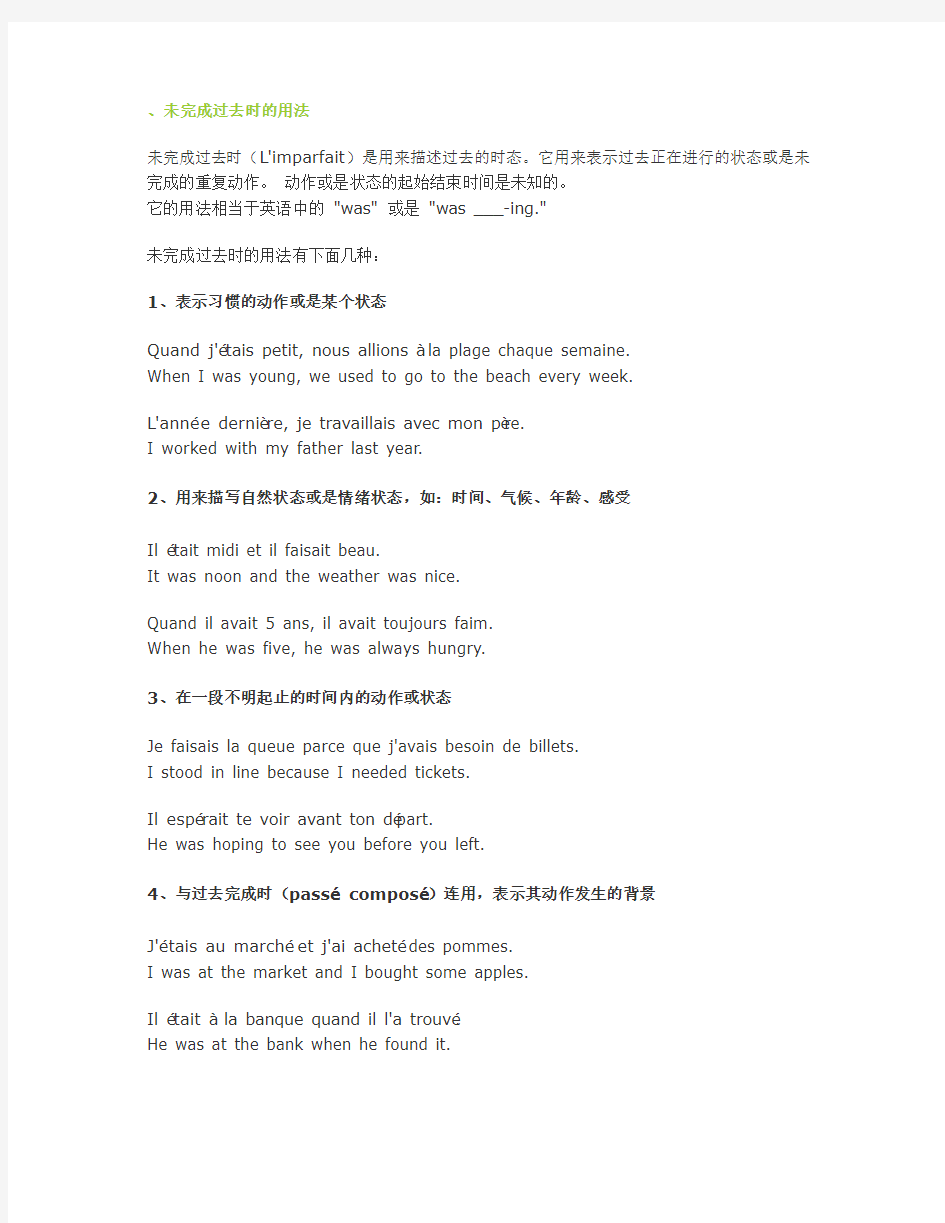
未完成过去时的用法
- 格式:doc
- 大小:60.00 KB
- 文档页数:5


、未完成过去时的用法
未完成过去时(L'imparfait)是用来描述过去的时态。它用来表示过去正在进行的状态或是未完成的重复动作。动作或是状态的起始结束时间是未知的。
它的用法相当于英语中的"was" 或是"was ___-ing."
未完成过去时的用法有下面几种:
1、表示习惯的动作或是某个状态
Quand j'étais petit, nous allions à la plage chaque semaine.
When I was young, we used to go to the beach every week.
L'année dernière, je travaillais avec mon père.
I worked with my father last year.
2、用来描写自然状态或是情绪状态,如:时间、气候、年龄、感受
Il était midi et il faisait beau.
It was noon and the weather was nice.
Quand il avait 5 ans, il avait toujours faim.
When he was five, he was always hungry.
3、在一段不明起止的时间内的动作或状态
Je faisais la queue parce que j'avais besoin de billets.
I stood in line because I needed tickets.
Il espérait te voir avant ton départ.
He was hoping to see you before you left.
4、与过去完成时(passé composé)连用,表示其动作发生的背景
J'étais au marché et j'ai acheté des pommes.
I was at the market and I bought some apples.
Il était à la banque quand il l'a trouvé.
He was at the bank when he found it.
5、表示愿望或建议
Ah ! Si j'étais riche !
Oh, if only I were rich!
Si nous sortions ce soir ?
How about going out tonight?
6、用于si引导的条件句中
Si j'avais de l'argent, j'irais avec toi.
If I had some money, I would go with you.
S'il voulait venir, il trouverait le moyen.
If he wanted to come, he would find a way.
7、用于短语être en train de和venir de 的过去时
J'étais en train de faire la vaisselle.
I was (in the process of) doing the dishes.
Il venait d'arriver.
He had just arrived.
变位形式
未完成过去时的变位
去掉现在式第二人称复数(nous)的词尾-ons,加上-ais,-ais,-ait,-ions,iez,-aient
je -ais nous -ions
tu -ais vous -iez
il/elle/on -ait ils/elles -aient
唯一一个不例外的动词是Être,它用词根ét-开头,但词尾规律仍是这样的。
例:
parler finir rendre allerêtre
je parlais finissais rendais allais étais
tu parlais finissais rendais allais étais
il parlait finissait rendait allait était
nous parlions finissions rendions allions étions
vous parliez finissiez rendiez alliez étiez
ils parlaient finissaient rendaient allaient étaient
注意:
1、以-cer 和-ger 结尾的动词变位后写法上有点特例
MANGER LANCER
je mang e ais nous mangions je lançais nous lancions
tu mang e ais vous mangiez tu lançais vous lanciez
il mang e ait ils mang e aient il lançait ils lançaient
这样做是为了发音上的便利。g 和c 后跟一个a 的音要发浊音,若是在g 后添加了一个e ,或是变c为ç可以软化发音,使之成为清音。
2、以i结尾的未完成过去时动词词根,在第一人称复数(nous)和第二人称复数(vous)变位时须要双写i 。如:
étudier
nous étudions
未完成过去时词根:étudi-
变位==>
高手TCF考试600分之心得分享
【法语入门】咿咿呀呀学法语儿语
法语学习-实用法语句型
法语语法宝典
法语四级词汇和语法练习
【听歌学法语】花样年华